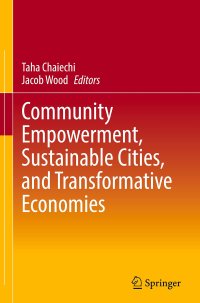
Ebook: Community Empowerment, Sustainable Cities, and Transformative Economies
Author: Taha Chaiechi Jacob Wood
This edited volume presents the conference papers from the 1st International Conference on Business, Economics, Management, and Sustainability (BEMAS), organized by the Centre for International Trade and Business in Asia (CITBA) at James Cook University.
This book argues that the orthodox methods of external risks, climate change adaptation plans, and sustainable economic growth in cities are no longer adequate. These methods, so far, have not only ignored the ongoing structural changes associated with economic development but also failed to account for evolving industries’ composition and the emergence of new comparative advantages and skills. Specifically, this book looks at the vulnerable communities and exposed areas, particularly in urban areas, that tend to experience higher susceptibility to external risks (such as climate change, natural disasters, and public health emergencies) have been largely ignored in incremental adaptation plans.
Vulnerable communities and areas not only require different adaptive responses to climate risk but also possess unlocked adaptive capacity that can motivate different patterns of sustainable development to achieve the goals of the 2030 Agenda. It is essential, therefore, to view transformative growth and fundamental reorientation of economic resources as integral parts of the solution.
Social disorganisation and vulnerability are other undesired outcomes of the unpredictable and widespread external economic shocks. This is due to a sudden and tough competition between members of society to acquire precious resources, most of which may be depleted during unprecedented events such as natural disasters or pandemics resulting in an even more chaotic and disorganised conditions.
This book argues that the orthodox methods of external risks, climate change adaptation plans, and sustainable economic growth in cities are no longer adequate. These methods, so far, have not only ignored the ongoing structural changes associated with economic development but also failed to account for evolving industries’ composition and the emergence of new comparative advantages and skills. Specifically, this book looks at the vulnerable communities and exposed areas, particularly in urban areas, that tend to experience higher susceptibility to external risks (such as climate change, natural disasters, and public health emergencies) have been largely ignored in incremental adaptation plans.
Vulnerable communities and areas not only require different adaptive responses to climate risk but also possess unlocked adaptive capacity that can motivate different patterns of sustainable development to achieve the goals of the 2030 Agenda. It is essential, therefore, to view transformative growth and fundamental reorientation of economic resources as integral parts of the solution.
Social disorganisation and vulnerability are other undesired outcomes of the unpredictable and widespread external economic shocks. This is due to a sudden and tough competition between members of society to acquire precious resources, most of which may be depleted during unprecedented events such as natural disasters or pandemics resulting in an even more chaotic and disorganised conditions.
Download the book Community Empowerment, Sustainable Cities, and Transformative Economies for free or read online
Continue reading on any device:

Last viewed books
Related books
{related-news}
Comments (0)